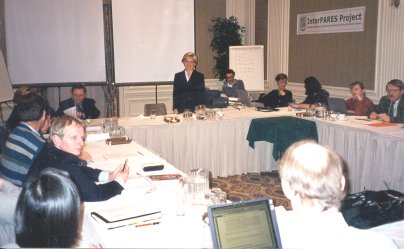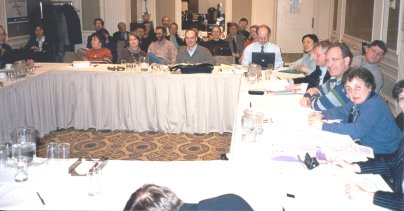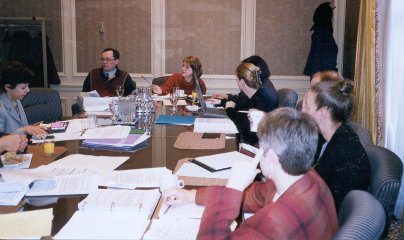|
|
|
International Team Research Workshop #4 |
||||
|
When: February 14-18, 2000 Where: Hotel Georgia, Vancouver, BC, Canada
Participants: Luciana Duranti, Terry Eastwood, Heather MacNeil, Ken Thibodeau, Bruce Walton, Anne Gilliland-Swetland, Phillip Eppard, Peter Horsman, Hans Hofman, Ken Hannigan, Ian Macfarlane, Torbjorn Hornfeldt, Maria Guercio, Paola Carucci, Rich Lysakowski, Bill Rhind, Ross Harvey, Du Mei Observers: John Roeder, Jason Baron, Barbara Craig, Catherine Bailey, Yvette Hackett, Bill Underwood, Su-Shing Chen, Gigliola Fioravanti, Christine Petillat, Francisco Barbedo, Qui Xiaowei, Chen Wei Assistants: Peter Van Garderen, Tahra Fung, Marta Maftei, Ian McAndrew, Claire-Yasmina Veisseire, Prisca Giordani, Robert Edwards, Eun Park
Workshop Objectives:
Summary: A large portion of the Workshop was devoted to the presentation and discussion of the Authenticity Task Force's case study overviews. Investigators briefly explained the nature and purpose of each case study system and answered a series of questions based on the Template for Analysis. These presentations prompted many comments and discussions about the methodology and value of conducting case studies. As a result of this discussion and of further examination, the Authenticity Task Force revised the questionnaire and the Template Element Data Gathering Instrument (TEDGI). In addition, it was decided that Round 2 of the Case Studies should include flexible, live systems. The Authenticity Task Force presented the schedules and deadlines for future case studies. The International Team and the Preservation Task Force discussed the scope of the preservation function. In addition, they began the modeling process for the preservation function. Once a high-level model was created, the Preservation Task Force proceeded to decompose the model. The Appraisal Task Force reviewed its progress to date. There was an analysis of Domain Research Questions, and discussions of the relationship between the Appraisal Task Force, the appraisal function, and other Task Forces. The Appraisal Task Force decided to work on a high level model before the next International Workshop. The Glossary Committee presented the preliminary research that was done prior to the Workshop. The committee developed and presented a workflow process for nominations, evaluation, and processing of glossary terms. In addition, they were able to discuss future plans including the Glossary system requirements and compliance with the applicable ISO standards. Workshop #4 concluded with a meeting of the International Team. All Task Forces reported on their work-to-date. Membership lists for all Task Forces were reviewed and revised. As well, organizational issues were clarified and objectives for Workshop #5 were identified.
Next International Team Research Workshop:
|
||||
|
|
||||



